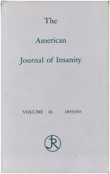Alcoholism and affective disorder: clinical course of depressive symptoms
Abstract
OBJECTIVE: This study compared the severity of and the change in depressive symptoms among men with alcohol dependence, affective disorder, or both disorders during 4 weeks of inpatient treatment. METHOD: After their primary and secondary psychiatric disorders were defined with the use of criteria based on chronology of symptoms, 54 unmedicated men entering treatment for alcohol dependence or affective disorder were assessed for 4 consecutive weeks with the Hamilton Depression Rating Scale. RESULTS: The findings indicate that the rate of remission of depressive symptoms was consistent with the primary diagnosis. Depressive symptoms remitted more rapidly among the men with primary alcoholism than among those with primary affective disorder. However, a minimum of 3 weeks of abstinence from alcohol appeared to be necessary to consistently differentiate the groups with dual diagnoses on the basis of their current depressive symptoms. Alcohol dependence occurring in conjunction with primary affective disorder did not intensify presenting depressive symptoms or retard the resolution of such symptoms. CONCLUSIONS: Diagnoses of alcohol dependence and affective disorder based on symptom chronology appear to have prognostic significance with respect to remission of depressive symptoms in men with both diagnoses. Depressive symptoms of dysphoric mood, dysfunctional cognitions, vegetative symptoms, and anxiety/agitation showed different rates and levels of remission across the primary diagnostic groups.
Access content
To read the fulltext, please use one of the options below to sign in or purchase access.- Personal login
- Institutional Login
- Sign in via OpenAthens
- Register for access
-
Please login/register if you wish to pair your device and check access availability.
Not a subscriber?
PsychiatryOnline subscription options offer access to the DSM-5 library, books, journals, CME, and patient resources. This all-in-one virtual library provides psychiatrists and mental health professionals with key resources for diagnosis, treatment, research, and professional development.
Need more help? PsychiatryOnline Customer Service may be reached by emailing [email protected] or by calling 800-368-5777 (in the U.S.) or 703-907-7322 (outside the U.S.).



